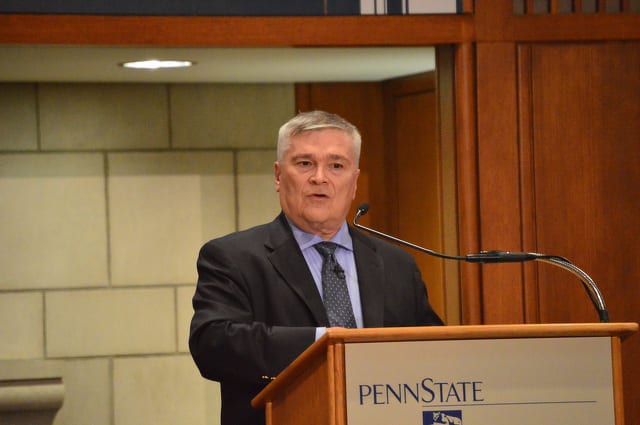In a letter sent Monday, Penn State President Eric Barron asked the State College Borough Council to reject a recently proposed set of guidelines for selecting an interim mayor that would exclude Penn State employees from consideration.
Borough Councilman Dan Murphy shared the letter on Twitter.
The guidelines, proposed last month by Councilwoman Catherine Dauler, outline potential qualifications that several members argue council can use to evaluate candidates interested in replacing Don Hahn, who is running unopposed for magisterial district judge in Tuesday’s election and is expected to resign as mayor in December with two years left in his term.
It appears we have some town (@MayorDonHahn) and gown agreement on the potential impacts of @State_CollegePA interim mayor guidelines as they’ve been presented. @penn_state President Barron just sent this note to Council re: his concerns. pic.twitter.com/wQkpkqG96x
— Dan Murphy (@danielwmurphy) November 4, 2019
Council is tasked with selecting an interim mayor, though the borough’s home-rule charter does not stipulate a procedure or qualifications, other than that the person selected is eligible to vote in State College
Dauler’s list has sparked intense debate during two recent council meetings, with Murphy and fellow councilmen Evan Myers and Jesse Barlow calling the proposed guidelines discriminatory and unnecessary. The suggestions that drew sharp criticism were that the interim mayor cannot be a Penn State employee, cannot run for mayor in the 2021 election and should have prior work experience in local government.
“I find it deeply troubling to exclude someone based on their place of employment,” Barron wrote in the letter addressed to Murphy. “With about 17,000 Penn State employees living in the Borough of State College, such a narrowing of the talent pool might deny our community from considering some of the best qualified individuals.”
He went on to note that Penn State employees are permitted to and have served in local government — Murphy and Barlow are both employed by the university. Barron also questioned the “strain” prohibiting a university employee from being chosen as mayor could inflict on town-gown relations.
“Taking this action now would disenfranchise thousands of your citizens and our employees and send the wrong message about working together as one community,” Barron wrote. “In addition, by excluding Penn State employees, you will narrow the pool of diverse candidates significantly, and you will limit the number of applicants from communities of color.”
Barron also noted that the university’s Government and Community Relations and Ethics and Compliance teams help provide guidance for employees running for elected office, and that Borough Solicitor Terry Williams can also provide direction to avoid any conflicts of interest.
Hahn has also sent a memo to council urging them not to adopt formal guidelines, warning that they would have ‘a chilling effect’ on qualified candidates.
Council will meet at noon on Wednesday to discuss and potentially vote on the proposed guidelines.
The deadline for letters of interest from potential candidates is 5 p.m. on Wednesday. A process approved by council in October calls for council members to reach a consensus on a candidate by Dec. 2 and formally vote on the interim mayor on Dec. 16, the day Hahn plans to resign.
StateCollege.com editor Geoff Rushton contributed to this story.



